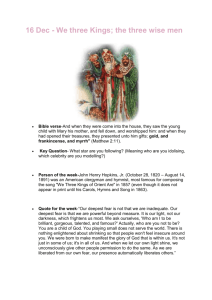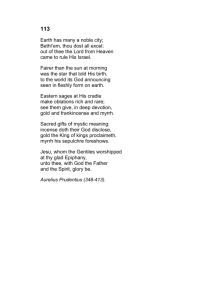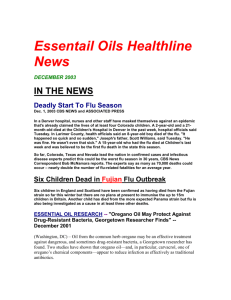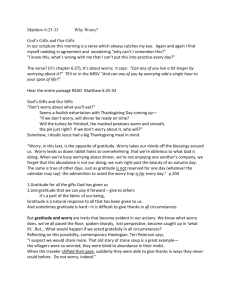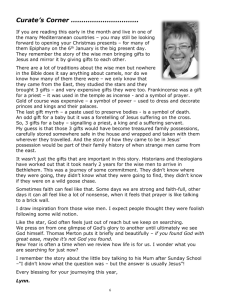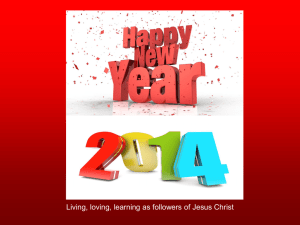ORPHIR CHURCH Sunday: 10
advertisement
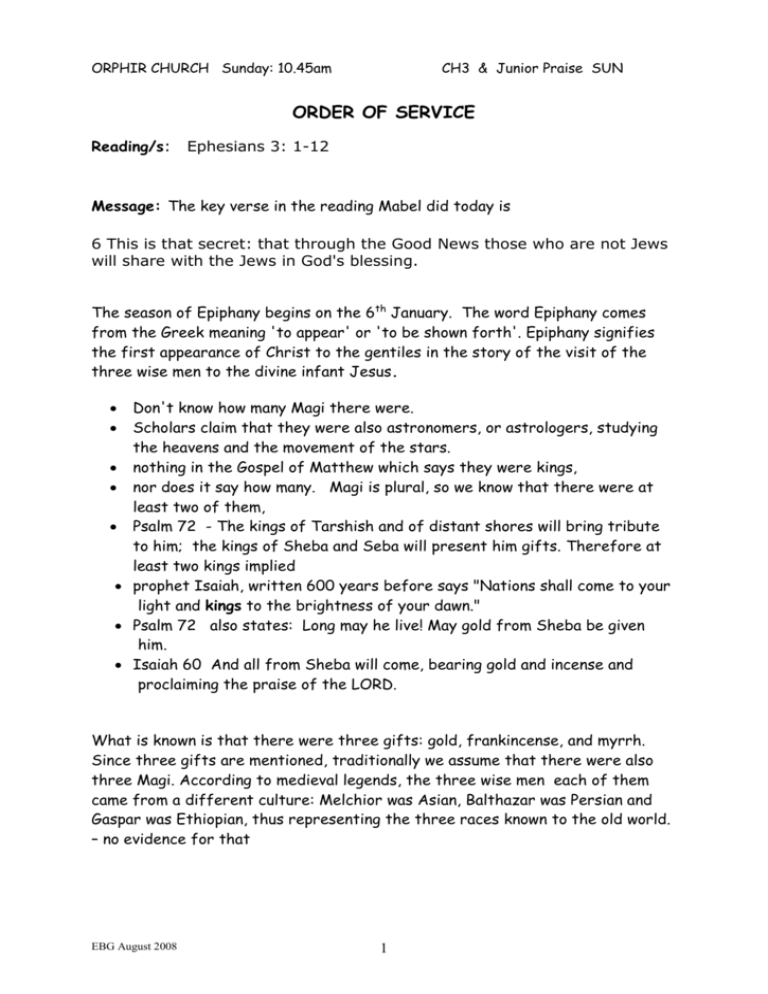
ORPHIR CHURCH Sunday: 10.45am CH3 & Junior Praise SUN ORDER OF SERVICE Reading/s: Ephesians 3: 1-12 Message: The key verse in the reading Mabel did today is 6 This is that secret: that through the Good News those who are not Jews will share with the Jews in God's blessing. The season of Epiphany begins on the 6th January. The word Epiphany comes from the Greek meaning 'to appear' or 'to be shown forth'. Epiphany signifies the first appearance of Christ to the gentiles in the story of the visit of the three wise men to the divine infant Jesus. Don't know how many Magi there were. Scholars claim that they were also astronomers, or astrologers, studying the heavens and the movement of the stars. nothing in the Gospel of Matthew which says they were kings, nor does it say how many. Magi is plural, so we know that there were at least two of them, Psalm 72 - The kings of Tarshish and of distant shores will bring tribute to him; the kings of Sheba and Seba will present him gifts. Therefore at least two kings implied prophet Isaiah, written 600 years before says "Nations shall come to your light and kings to the brightness of your dawn." Psalm 72 also states: Long may he live! May gold from Sheba be given him. Isaiah 60 And all from Sheba will come, bearing gold and incense and proclaiming the praise of the LORD. What is known is that there were three gifts: gold, frankincense, and myrrh. Since three gifts are mentioned, traditionally we assume that there were also three Magi. According to medieval legends, the three wise men each of them came from a different culture: Melchior was Asian, Balthazar was Persian and Gaspar was Ethiopian, thus representing the three races known to the old world. – no evidence for that EBG August 2008 1 Symbolism of the gifts Gold is a gift for a King, symbolising Jesus' kingship. They brought gold. Gold was a symbol of kingship, a symbol of power. It represented then, as now, financial security. Frankincense is highly fragrant when burned an incense used by priests used in religious ceremonies, as a pleasant offering to God symbolising Jesus' priesthood - Christ's function as our great high priest. but its significance extends further. Incense is burned before God to give honour to that which was considered holy. It acknowledges the presence of divinity; The gift of frankincense alludes to the fact that Jesus is our priest and our God. the well-known carol we shall sing later "We Three Kings" states: "Incense owns a Deity nigh." Myrrh is an ointment used to heal medicinally in the Greco-Roman world and relief of pain., but was also used to embalm the bodies of the dead. It is for this reason that Myrrh is taken to be a symbol of Christ's death that Jesus was born to die. The myrrh tree has numerous long thorns, reminiscent of Christ's crown of thorns. Christ was offered myrrh and wine while He was on the cross Nicodemus brought a mixture of myrrh and aloes, along with linen cloths, to prepare His body for burial. This is seen as the hard, the bitter gift. a symbol that Christ would be willing to do the hardest task that God would call him to do. – I think that it may also symbolise that Jesus was there to heal Together, the three types of gifts represent three roles of Jesus the Messiah: His kingly office is represented by gold, His divinity by frankincense, and His humanity by myrrh. Practicality of the gifts Something I had often wondered about – thinking of Mary and Joseph’s situation and having to flee from Herod – how did they go about traipsing around lugging gold and the other gifts; EBG August 2008 2 Gold could be exchanged for a multitude of practical things that the baby would need—food, shelter, clothing, schooling. They needed it in their flight to Egypt. From Matthew's account, we get the impression that this flight was in hast. They had only travelled to register for a census – Mary on a donkey so they would not have had many possessions with them. They probably expected to return home. They were not expecting to have to flee. The Holy Family needed the gold to live on in Egypt until it was safe to return. Joseph would have needed to buy new tools and money would have been needed to set up shop when they went to Nazareth. The Frankincense perhaps the first thing the frankincense might have been to burn some of the fragrant resins to perfume the air in the stable. as James said when talking about the shepherds – the people lived more closely with their animals and stables were not like modern equivalents - Real stables in the Middle East are enclosures, often caves, redolent of soot from fires and accumulated layers of sheep and goat droppings. Even if Joseph, had cleaned the stable, it still could have benefited from air freshener. may have been used in the home of the Holy Family as they prayed, as well as being given to the Temple priests as a sacrifice, - but I think there is a use far more likely Frankincense was used to stop bleeding, to heal wounds, and for cleansing. It was also an ingredient used in the antidotes for some poisons and in prescriptions that would ease pain. All children have cuts and scrapes as they grow up – Joseph was a carpenter – injuries were all too likely – and the chances of wounds festering were much greater in those days Mary would have been thankful for frankincense— a valuable addition to her first-aid kit. Myrrh too was used medicinally in the Greco-Roman world. Not only was it thought to help cure eye inflammations and earaches, but it was also used in prescriptions for quartan fever, dropsy, and relief of pain. If the myrrh presented to the Christ child had been oil of myrrh, it was a gift that would guard against the chilblains of winter and the dry, cracked skin of summer. Some commentators have said - It is likely that Mary saved the myrrh for Jesus' burial; although it is also likely that some of it was used for Joseph's burial as well. – I don’t know where they get that - would she have known she would be around when he died would a new mother have been thinking about that then. EBG August 2008 3 Through their great practicality they would have given Mary peace of mind, knowing that financial concerns and many physical worries could be dealt with. Other comments about the gifts: Symbolism may also be present in the way that frankincense and myrrh are harvested. These fragrant resins are collected as solidified drops exuded from small trees growing in the desert. Although the trees naturally emit resin, when their branches are incised the resin flow increases. In a similar way, when Christ came to this earth, His love flowed naturally, and those around Him could sense the fragrance and wonder of His life; however, when He was crucified on the tree, evidence of His love for humankind poured forth in abundance. Gold is found in the ground Gold is enduring, and can withstand all natural acids and even fire. to this feature when wedding ring becomes the symbol of a marriage which will hopefully endure the tests of time, tribulation, hardships, disagreements, illness, bereavement, and - - - teenage children! Gold is adaptable for shaping and readily alloyed with other metals. There's an ancient soldier's helmet on display at the Pennsylvania State University museum. This beautifully crafted head-piece was hammered out of one solid piece of gold. But if it is soft enough to be easily moulded, gold can easily be combined with other metals to provide an even greater strength. The rings would be pressed out of shape if it hadn't been for the fact that the gold is combined with another, less pliable metal. Even gold, with all its beauty and virtues needs others to compliment it. Wouldn't it be far better for us to be like gold, rather than to have gold? Humility, beauty, endurance, adaptability - a person with these qualities would be priceless. The primary lesson from frankincense is that our worship is to be pleasing to God. Remember, this sweet smelling resin comes as the result of the tree's woundedness and pain. When we can worship God in the midst of our sorrow, our brokenness, then it is a sweet smelling offering. That's why David said, "The sacrifices of God are a broken spirit: a broken and a contrite heart, O God, thou wilt not despise." (Psalms 51:17 ) For many of the ancients, myrrh was considered to be a favourite perfume, said to keep its fragrance for several hundred years when kept in an alabaster pot. Myrrh also had medicinal qualities, sometimes mingled with wine to form an article of drink. Such a drink was given to our Savior, when EBG August 2008 4 about to be crucified, as a stupefying potion, (Mark 15:23; Matthew 27:34). We bring gold to honour Him as King, and to yield to the purification process of the fiery trials. We bring frankincense to worship Him even in the midst of our brokenness. And we bring myrrh to recognize that He has identified with us in our pain and sorrow. Questions for us – gifts Gold - this is about stewardship – our giving in a financial sense Frankincense - For us this is the gift of faith and service, a gift which draws us together to work for the coming of the kingdom of God. In the year ahead giving this gift might involve rededicating ourselves to work for the good of all people, including and not excluding the marginalized and oppressed, recognizing in each person a brother or sister, a child of God. This gift might call us to deepen our spirituality, to commit to Bible study or prayer, it might draw us toward hands on work. This is the gift given each week by our choir and our Sunday school teachers etc Myrrh - In the year just begun what are the hard things that we might be called to do? If we give them to God in Jesus Christ, if we dedicate our hard moments and lay them at the manger, then we will be given the courage to face them and we will be given God's presence with us as we are called to do more than we think we are able to do. EBG August 2008 5
